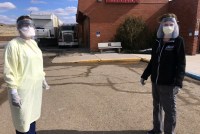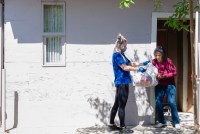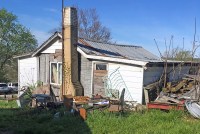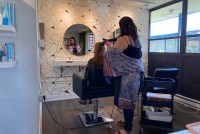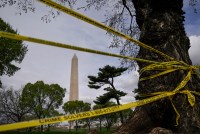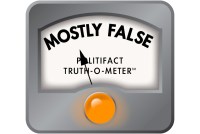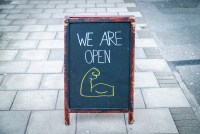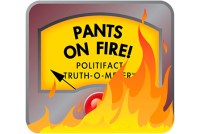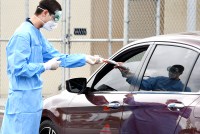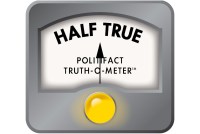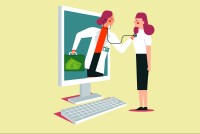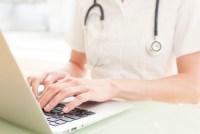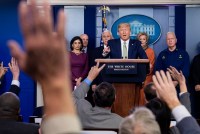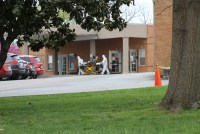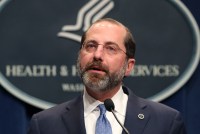Latest KFF Health News Stories
Under COVID Cloud, Prisons In Rural America Threaten To Choke Rural Hospitals
A rural Montana county of 5,000 people lays claim to the state’s highest COVID-19 infection rate. The community risks additional spread, though, because of a private prison situated there. If the virus infiltrates the prison and just a fraction of inmates get sick, the area’s limited health resources may not endure.
Beyond The Glam: Feeding The Coachella Valley’s Most Vulnerable Residents
Poverty is real in the Coachella Valley, a region known for its glitzy resorts and music festival. During the COVID crisis, the California National Guard and California Conservation Corps are helping an area food bank distribute food to older residents and those with disabilities.
Racial Status And The Pandemic: A Combustible Mixture
The novel coronavirus is affecting black Americans disproportionately, which some community leaders and public health experts say is not surprising. So why didn’t anyone sound an alarm?
Millions Stuck At Home With No Plumbing, Kitchen Or Space To Stay Safe
In 470,000 American homes spread across every state, washing hands to prevent COVID-19 may not be as easy as turning on a faucet. They don’t have showers or toilets or, in some cases, even water piped into their homes. Nearly a million U.S. homes don’t have complete kitchens and millions more are overcrowded, making it much tougher for people to shelter in place and avoid infection.
How COVID Colors The Salon Experience
As Colorado gradually reopens, a beauty salon in Loveland is swamped as its clients clamor for haircuts, trims and color. But business isn’t exactly back to normal as new precautions slow every step.
Analysis: We Knew The Coronavirus Was Coming, Yet We Failed 5 Critical Tests
The vulnerabilities that COVID-19 has revealed were a predictable outgrowth of our market-based health care system.
Southwest CEO’s Boast About Airplanes’ Low COVID Risk Flies By Key Concerns
Airplanes are small enclosed spaces where social distancing poses special challenges, making this statement an overstatement.
COVID Survivors’ Blood Plasma Is A Sought-After New Commodity
A possibility that the blood of people who had COVID could save others has set off a mad scramble for donors — with top-dollar offers and a plan that relies on the blood of 10,000 Orthodox Jewish women.
Reopening In The COVID Era: How To Adapt To A New Normal
States and the federal government are experimenting with steps that will allow people to start working again and returning to more typical lifestyles. But public health experts offer their thoughts on the related risk-benefit calculations.
How The Pandemic And An Anti-Vax Health Official Are Roiling A Montana Community
In one conservative pocket of Montana, a local health board member who opposes vaccinations helped fight the state’s stay-at-home rules. But now, as the state slowly reopens, she faces a backlash of her own.
Trump’s Claim That U.S. Tested More Than All Countries Combined Is ‘Pants On Fire’ Wrong
When you factor in population size, the U.S. is still behind.
Do-It-Yourself Cheek Swab Tested As Next Best Thing To Detect Coronavirus
Los Angeles County is providing thousands of coronavirus self-testing kits to its citizens, but public health officials are leery of the shortage of data on whether this easier method ― in which an individual swabs his or her own cheek ― is as reliable as a less comfortable but well-established technique.
Trump Says N95 Masks Can Be Sterilized For Reuse. Only In A Pinch, Experts Warn.
Repurposing one N95 mask 20 times is not the same as having 20 new ones.
Telehealth Will Be Free, No Copays, They Said. But Angry Patients Are Getting Billed.
Politicians pledged to stop providers from charging for video appointments or telephone calls, but some patients are being charged $70 or $80 per virtual visit.
Born Into A Pandemic: Virus Complicates Births For Moms And Babies
COVID-19 is changing medical care, not only for vulnerable elders but also for pregnant women and their babies entering the world.
Vaping, Opioid Addiction Accelerate Coronavirus Risks, Says NIDA Director
Dr. Nora Volkow, who heads the National Institute on Drug Abuse, details how emerging science points to added challenges for these patient populations and the public health system.
Coronavirus Crisis Opens Access To Online Opioid Addiction Treatment
Under the national emergency, the government has waived a law that required patients to have an in-person visit with a physician before they could be prescribed drugs that help quell withdrawal symptoms, such as Suboxone. Now they can get those prescriptions via a phone call or videoconference with a doctor. That may give video addiction therapy a kick-start.
Coronavirus Fuels Explosive Growth In Telehealth ― And Concern About Fraud
“Unscrupulous providers” could take advantage of the boom in treatment delivered via voice or video calls.
Before ‘Tidal Wave’ Of Illness, Nursing Home Thought It Had COVID-19 Contained
Though it already had one staff member testing positive for the coronavirus, the Gallatin Center for Rehabilitation and Healing did not tell 911 operators this fact as it called ambulances to take residents in respiratory distress to the hospital, a WPLN investigation reveals.
In Fine Print, HHS Appears To Ban All Surprise Billing During The Pandemic
Language in the CARES Act says providers who take emergency funding cannot balance-bill coronavirus patients ― and “every patient” is considered a possible COVID-19 patient.



